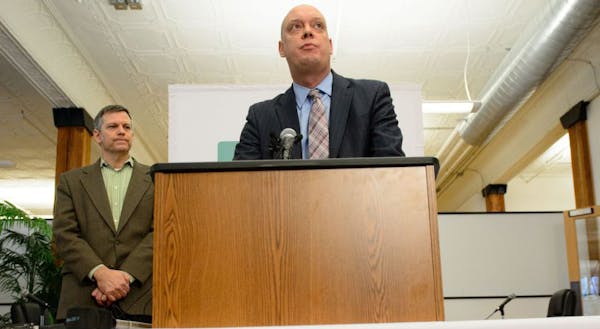At first glance it would appear that the end of April Todd-Malmlov's tenure as head of MNsure was a straightforward case of being held accountable for performance.
She had a big job, running the online insurance exchange that is the centerpiece of the state's effort to implement the Affordable Care Act, and the exchange is still working far from perfectly. As the deadline for getting consumers insured is now measured in days and not weeks, the hourglass is down to the last few grains of sand.
Todd-Malmlov was the boss, errors kept happening, and so now there is a new boss.
That narrative, of course, is mostly nonsense.
Todd-Malmlov had her job due to her command of health policy and, presumably, the reality of health care politics. She's out because she had become a political liability of the first order for Gov. Mark Dayton, not because of the performance of a website she was in charge of delivering.
The performance of MNsure wasn't perfect, but it should have been good enough. Alok Gupta, professor of information and decision sciences at the Carlson School of Management at the University of Minnesota, put it this way: "I was surprised that MNsure worked as well as it did."
Certainly mistakes were made by MNsure's leadership, as mistakes always are, but maybe none so fundamental as agreeing to take this no-win job in the first place.
"Let me give you some context," Gupta said. "When companies do something enterprise-wide, they usually have a time frame of from two to seven years to implement the whole thing. This scale [for MNsure] in some sense is much bigger. The complexity is greater. And they had less than two years."
None of the information technology professionals I talked to this week had looked under the hood of MNsure, but they were confident they knew how big the task was of developing it. It is what they called a massively transactional site. If not exactly another Amazon.com, it was more similar to that than to a simple Web application developed for a particular government agency.
On the consumer side, MNsure had to have the flexibility to deal effectively with consumers of different ages, health conditions and a host of other variables. It also had to take this data and integrate it with the IT systems of various other parties in the health care system, including big health plans like Medica and HealthPartners.
These aren't particularly daunting challenges, and no genius had to invent anything to make it work. That is, if there's enough time and budget. As IT consultant John Flavin, the managing partner of Minneapolis-based Softcrylic, put it, "the thing that gets squeezed the most on these kinds of projects is always testing."
Now, with concerns about data properly getting to insurers in time to start coverage in January, the remaining critical problems should be fixable, the consultants suggested. If nothing else, with an all-hands-on-deck approach there should be time to put in temporary patches or even collect and transfer data manually if MNsure has to.
These IT consultants, with political experience that consists largely of voting, talked also about the politics of MNsure's rollout. They can't see any upside in repeatedly issuing an implied promise to have a site that works flawlessly for enrollment and shopping of insurance, not when anybody who's ever touched an IT project of this complexity knew there were going to be problems that needed fixes.
Gently managing down the expectations of clients, at least into the range of the reasonable, is one of the ways IT consultants keep from getting fired.
Managing the political expectations should have been the easy part for Todd-Malmlov, who resigned Tuesday night. She had been Minnesota's health economist and was responsible for consulting policymakers on health care access and cost, and had also worked at UnitedHealth Group. She has a master's degree in public health from the University of Minnesota.
Even her critics were impressed with her command of health care regulations and how various aspects of health care reform would affect different types of consumers and businesses. In past interviews she has alluded to working 80-hour weeks to prepare for the launch. While that may seem like an exaggeration, the guess here is that it's more accurate than not.
To suggest someone is good at politics, when they serve in government, is no insult. It means being on top of policy options, communicating effectively and making sure that all of the parties with a stake in the policy outcomes felt they were given a fair shot.
Not embarrassing the boss, the governor, should also be on that list.
That's what makes it difficult to understand the thinking behind jetting to a tropical vacation for eight working days in November as concern about the exchange's effectiveness mounted. "I will be out of the office until Monday, December 2," read an e-mail from Todd-Malmlov dated Nov. 24, as detailed in a post on Watchdog.org.
Checking the out-of-office reply box on her e-mail before leaving town turned out to be a very bad idea.
The irony of the politics of MNsure is that next fall, when Minnesotans go vote for a state representative and governor, the MNsure site will almost certainly be running very smoothly, enabling people to shop and sign up for health insurance in plenty of time for the start of the January 2015 insurance year.
Hopefully, MNsure will be performing well enough that a newly elected Republican majority in the house won't be coming to work in January 2015 with shutting down MNsure as its highest legislative priority.
lee.schafer@startribune.com • 612-673-4302

Schafer: What do you really need to retire?

Schafer: How doing business can be a bit more like Christmas morning

Schafer: There won't soon be another opportunity to rethink the I-94 corridor

Schafer: The fruits of Honeywell's long-game dedication to quantum computer now being seen


